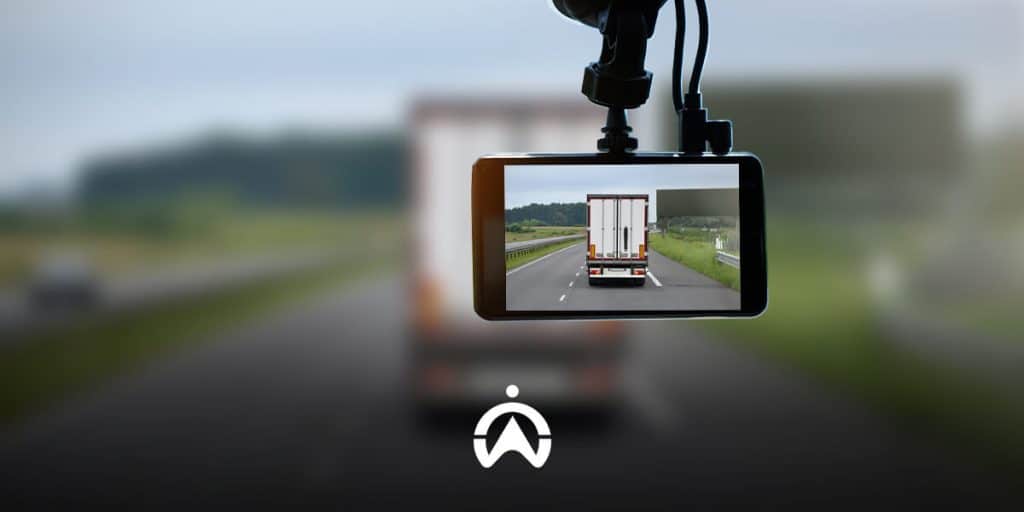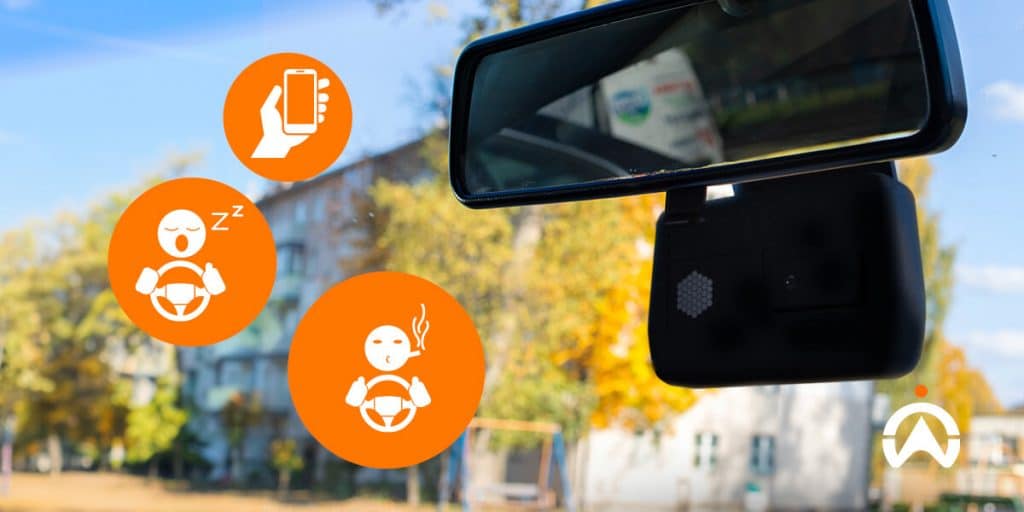
Fleet Dashcams
Vehicle dashcams for your fleet are not just good for recording footage; they act as a reliable, always-on witness that can protect your drivers, vehicles and business.
Let’s zoom in on the ins and outs of dashcams and explore their transformative impact on modern fleet management.
In this article, you will:
Learn what dash cams are and their role in fleet management
Know the difference between fleet and ordinary dashcams
Understand how fleet dashcams safeguard your drivers and fleet
Uncover the multiple benefits of fleet dashcams
Explore the features and benefits of Cartrack’s AI-powered cameras
What are fleet dashcams?
Fleet dashcams are advanced video recording systems installed in company vehicles.
These dashcams go beyond just recording — they serve as reliable witnesses, capturing every trip event and offering a comprehensive lens on your fleet’s activities.
With features tailored to meet the demands of commercial operations, fleet dashcams provide a crucial layer of security, enhancing driver safety, ensuring regulatory compliance, and protecting businesses from potential liabilities. From real-time monitoring to precise GPS tracking, these nifty devices are instrumental in promoting a culture of accountability, safety, and operational excellence within your fleet management practices.
Key features to consider when selecting a dashcam for a fleet
When choosing a dashcam for your fleet, ask yourself if your fleet needs basic dashcams that are for everyday use or dashcams that come with specific features to better suit your fleet’s needs.
Here are the features any fleet dash cam should come with:
- Video quality
- Wide-angle lens
- Storage capacity
- GPS integration
- Real-time alerts
- Cloud connectivity
- Durability and weather resistance
- Audio recording
- Ease of installation and maintenance
- Compatibility with fleet management systems
Then there are those dash cams that provide you with a little extra to enhance the fleet management and safety side of your business. If this is a major focal point, then ensure your fleet is installed with the best.
Here are some benefits:
Advanced tech for peace of mind: With GPS tracking and real-time alerts, you can monitor your fleet’s every move. You can receive instant notifications about potential incidents and securely store all critical footage on the cloud.
Tailored to your needs: Customisable settings let you tweak recording quality, storage duration, and event-triggered recording. It’s all about making the system work just the way you want it to.
Insights that drive success: Dashcam footage is a goldmine of information about driver behaviour, road conditions, and overall fleet performance. Use it to fine-tune your strategies and train your drivers to be top-notch.
Stay on top of emergencies: Real-time monitoring keeps you in the loop, ready to spring into action at a moment’s notice. Your drivers? They get live support whenever they need it.
Compliance made easy: Think of it as your legal safety net – dashcams provide the evidence you need to ensure you’re always on the right side of the law. No more headaches when it comes to disputes, accidents, or legal matters.
A culture of safety and trust: Dashcams foster a culture of accountability and safety within your team. Drivers feel empowered, and you create an environment that prioritises their well-being and the efficiency of your fleet.
Fleet dashcams vs ordinary dashcams, what’s the difference?
The difference lies in your main need for a dashcam.
You’re probably asking yourself, “Couldn’t I just install any old dashcam I find at the store?” The answer is yes. You could use an ordinary consumer dashcam for your fleet, but when it comes to reaping the actual benefits, the more affordable consumer option just won’t cut it.
On the surface, ordinary dashcams and fleet dashcams appear the same. Both record video footage from a vehicle’s front-facing view and that footage can be reviewed to see exactly what happened in a specific situation or accident as video evidence. But that’s where similarities between the two devices end.
Fleet dashboard cameras are designed for commercial fleets and provide managers with the driver insights they need to effectively manage their fleet. Ordinary consumer dashcams are low-cost and targeted only towards personal use in a single car, and give you zero driver insights. Due to their very limited functionality, they’re not suitable for fleet use.
Benefits of using fleet dashcams?
From boosting safety to cutting down costs, these cameras are the secret weapon every smart fleet manager needs and here’s why:
- Gain full visibility into critical events: With fleet dashcams, you can have an unobstructed view of crucial moments, such as capturing a sudden brake or swerving to avoid an accident. This comprehensive footage helps you understand the context of each event and make informed decisions live in the moment.
- Increase safety, prevent accidents, and reduce claims: Fleet dash cams can help identify risky driving behaviour, such as sudden lane changes or tailgating, enabling you to provide timely feedback and training to your drivers, thus preventing potential accidents.
- Protect your drivers and fleet against false claims: In case of an alleged collision or incident, dashcam footage serves as irrefutable evidence, protecting your drivers and fleet from fraudulent or misleading claims.
- Coach your drivers better to improve safety: Using dashcam footage, you can offer specific examples of both exemplary and concerning driving behaviour to your drivers, facilitating targeted coaching sessions and enabling them to improve their skills on the road.
- Enhance fleet efficiency and save time: Analysing dashcam footage can help identify inefficient routes, excessive idling, or unauthorised vehicle use, allowing you to optimise routes, reduce fuel consumption, and save valuable time and resources for your business.
In addition, dashcams can also be used to prevent theft and vandalism, collect evidence of fraud, and create training materials for drivers.
Loving these benefits?
Then you’ll love an equally crucial aspect: the security of these fleet dashcam systems. Understanding the measures in place to protect your data is key to leveraging their full potential.

Security measures on dashcams
Only authorised staff can access recorded videos or images, so managers and drivers can ask for the driving event videos or images. Usually, data is kept for 90 days, but the fleet company decides when to delete it. When it comes to what kind of data can be saved, according to GDPR rules, videos not linked to any specific events should not be saved.
The General Data Protection Regulation (GDPR) is designed to protect sensitive information. Here are some ways that fleet dash cam systems adhere to these rules and protect sensitive data:
Restricted access: Video or image captures are restricted to authorised personnel only.
Privacy by design: Fleet dashcam systems are designed with privacy in mind, allowing fleet managers to configure and customise the dashcam settings and setup for privacy compliance.
Customisable settings: Fleet dash cam systems offer customisable settings, allowing fleet managers to disable certain features like in-cabin recording and distracted driver features.
Private mode: Drivers can activate private mode during non-working hours, ensuring that video and images are no longer sent to the cloud.
Secure storage: Fleet dash cam systems offer cloud storage capabilities, ensuring that sensitive data is stored securely and accessible only to authorised personnel.
Compliance with GDPR: Fleet dash cam systems must comply with privacy regulations such as GDPR, ensuring that sensitive data is protected and used only for authorised purposes.
Will drivers be monitored 24/7?
Much like anyone, drivers want to have their privacy protected, so they are often apprehensive about a camera watching their every move.
With compliant dashcams, drivers’ privacy is top-notch. These systems are highly adaptable, allowing features like in-cabin recording and distracted driver alerts to be switched off, focusing solely on what’s happening on the road.
Some fancy dashcams even have a live-streaming option for extra driver support, and drivers get a heads-up when their manager uses it.
Why use dashcams for fleet management?
In recent years, dashcams have gained significant popularity as essential tools for fleet management, and the reasons behind their widespread adoption are clear. Specifically designed for professional use, commercial dashcams provide a tailored set of advantages catering to the distinct requirements of fleet operations.
Notably, these robust dashcams comply with the General Data Protection Regulation (GDPR), boast tamper-resistant designs, and are skillfully hardwired for hassle-free installation. Moreover, they offer a host of sought-after features, such as:
- Automatic download of pertinent footage
- Remote accessibility for real-time monitoring and configuration
- Support for multiple cameras
- Utilisation of commercial-grade SD cards
In essence, dashcams are a valuable asset for fleet managers of all sizes, making a substantial impact on safety, cost reduction, operational efficiency, and customer service improvement.
They play a crucial role in identifying drivers engaging in unsafe practices, like speeding or tailgating, and provide targeted coaching to enhance their driving behaviour. Dashcam footage becomes a lifeline when it comes to exonerating drivers involved in accidents that were not their fault, resulting in significant savings on insurance or other driving costs, such as speeding tickets.
By pinpointing areas of excessive idling, dashcam footage allows fleet managers to educate drivers on the importance of reducing idling, leading to substantial fuel cost savings.
The Big Plus of Dashcams and GPS Vehicle Tracking Working Together
Fleet dashcams, when coupled with GPS tracking, serve as a potent asset for effective fleet management, delivering real-time insights into driver behaviour and vehicle activities.
Here’s a breakdown of their operational process:
- Installation: Dashcams are strategically placed in each fleet vehicle, typically on the windscreen or dashboard, and connected to the vehicle’s power source.
- Continuous recording: These dashcams maintain an uninterrupted record of video footage, encompassing the road and, in certain instances, the driver and the vehicle’s interior. The recorded data is securely stored either on the device itself or in the cloud, depending on the system’s configuration.
- GPS tracking: Equipped with a GPS receiver, the dashcam captures essential information about the vehicle, including its precise location, speed, and travel direction. This data is seamlessly synchronised with the video recordings, providing a comprehensive overview of the vehicle’s activities.
- Event triggering: Dashcams can be customised to automatically preserve video clips triggered by specific events like abrupt braking, sharp turns, or collisions. These clips are conveniently tagged with GPS data, simplifying the process of locating and reviewing them when necessary.
- Real-time monitoring: Fleet managers gain access to a web-based dashboard that not only streams live video feeds from the dashcams but also presents the GPS tracking data for each vehicle. This real-time monitoring empowers managers to quickly address any issues or emergencies.
- Reporting and analytics: Many fleet dashcam systems include reporting and analytics features that empower managers to create custom reports grounded in GPS and video data. This capability aids in identifying patterns, enhancing driver conduct, and diminishing the potential for accidents.
- Safety and insurance advantages: Fleet dashcams complemented by GPS tracking offer real-time feedback to drivers concerning their behaviour, fostering enhanced safety practices. In cases of accidents, the dashcam’s video evidence can expedite the insurance claim process and potentially lead to reduced insurance premiums.
- Integration with other systems: Certain fleet dashcam systems can integrate with other fleet management tools, including telematics platforms, dispatch software, and maintenance systems. This integration provides a comprehensive outlook on the fleet’s operations.
How can fleet dash cams help with insurance claims?
Curious about how you can give your fleet a safety and security boost while also streamlining insurance claim processes? Fleet dashcams might just be the game-changer your business needs.
Take a look below at the various ways fleet dashcams can revolutionise the way you handle insurance claims.
- Clearing driver’s name: Fleet dash cams provide video evidence that can prove drivers’ innocence in accidents or false claims, helping cut down on insurance expenses and shielding drivers from blame.
- Enhancing driver safety: Fleet dashcams serve as coaching tools for better driver behaviour, reducing the likelihood of accidents and insurance claims.
- Valuable video evidence: Fleet dashcams offer crucial video evidence for quick insurance claim processing and fraud prevention.
- Monitoring fleet activity: Fleet dashcams monitor vehicle activity, optimising overall fleet efficiency and minimising accident risks and insurance claims.
Do fleet dash cams require professional installation?
Once you know all the crucial insights and benefits dashcams can give your business, it’s time to make that purchase. But once that’s done, what is the actual process, what is the very next step?
Installation.
Whether you’re planning on professional installation or taking the DIY route, setting up these cameras for your commercial fleet is a lot smoother than you might think.
The installation of fleet dashcams can be carried out either by professionals or by fleet owners themselves. Certain dashcam models come with specific installation requirements to ensure comprehensive coverage of critical events.
However, it is advisable to opt for professional installation to guarantee accurate setup and seamless operation. Fleet dashcams are intentionally designed to offer user-friendly installation and operation, boasting an interface that allows easy access to live video feeds and footage from any device.
This simplified installation approach ensures that fleet managers can swiftly integrate the dashcams into their operations without encountering unnecessary complications or vehicle downtime delays.
What is the best dashboard camera to buy for my fleet?
With plenty of options available, you wouldn’t want to choose the wrong one.
When selecting the ideal dashboard camera for your fleet, it’s essential to consider the unique requirements of your specific fleet and business operations. Assess the key factors that play a significant role in your daily operations, such as the size of your fleet, the nature of your cargo, and the types of routes your vehicles typically drive through. Look for a dashboard camera that offers tailored features to address these specific needs.
When choosing a dashcam for your fleet, it is important to compare the features and pricing of different models and the reliability and reputation of the brand, this will help find the product that will best meet your needs.
If you’re looking for real-time tracking, customisable settings, AI-powered functionalities and a trusted name, then Cartrack’s camera solutions are a no-brainer.

Cartrack’s AI-powered, live-stream camera
Cartrack is a global leader in providing data-driven solutions, catering to each part of your business, especially drivers and fleets, including; fleet management, driver behaviour management, asset tracking and recovery.
Our all-inclusive fleet management platform includes our smart AI-powered fleet dashboard cameras.
With up to 8 internal or external camera installations, your business can experience real-time monitoring for enhanced safety, streamlined operations, and increased efficiency for your drivers, fleet and cargo.
What makes our AI camera solution different from the rest:
- Swift detection of potential safety threats in driver behaviour
- Promotes driver accountability and encourages improved driving habits
- Provides real-time tracking for efficient fleet management
- Reduces potential accident events
Smart cameras: The future of fleet management
What makes this technology tick is the Internet of Things (IOT), a network of linked devices equipped with sensors, software, and connectivity, delivering instant vehicle data right to your desktop. With this and Live Vision, our cameras have live streaming, an AI feature that ensures 24-hour visual access to your vehicles, both internally and externally.
Driving events that these cameras can detect:
Distracted or fatigued driving: the driver’s head and eye movements are monitored to see whenever the driver’s attention diverts from the road, suggesting distraction. This eye movement will be detected and an instant alert will sound to warn the driver.
Mobile phone use detection: the cameras can also detect signs of phone use while driving, and audibly alert drivers of the distraction so they can put away their phone and pay attention to the road.
Yawning: Frequent yawning is a clear sign of severe fatigue. These cameras will instantly alert drivers when signs of fatigue are detected so they can be reminded to take a rest and prevent a collision.
Camera-Covering Detection: The moment the dashcam is covered an audible alert will be triggered reminding eh driver to remove the obstruction to ensure driver and vehicle safety is not jeopardised.
The smart camera solution for your fleet
Now, you’re equipped to find the best fleet dashcams for your business.
Cartrack’s leading camera technology, advanced safety features and smart fleet management software work hand-in-hand to provide the ultimate solution for all your fleet dashcam needs.
Contact us today for the only camera solution you’ll ever need
